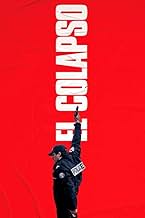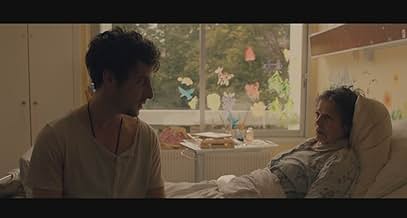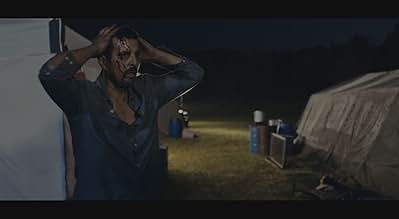VALUTAZIONE IMDb
7,8/10
2959
LA TUA VALUTAZIONE
Cosa accadrebbe alla nostra società se il sistema crollasse domani?Cosa accadrebbe alla nostra società se il sistema crollasse domani?Cosa accadrebbe alla nostra società se il sistema crollasse domani?
- Premi
- 2 candidature totali
Sfoglia gli episodi
Recensioni in evidenza
This excellently made short series is atmospherically dense like Black Mirror.
But it's not about the consequences of technological development.
At least not directly. But about the collapse of the social order, the survival of people while everything around them no longer exists.
Each individual episode represents a certain period of time, e.g. episode 7, which shows a woman surviving 50 days after the collapse of society (one of the best episodes, by the way). The exception is the last episode 8, which shows the events 5 days before the collapse.
A much too unknown series that left a deep impression on me. Unfortunately the series only consists of 8 episodes, each about 15-25 minutes short. The short duration of the episodes is an advantage when designing a captivating episode. I hope there will be a new season with more episodes at some point. With episodes this short, there should be at least 15 episodes.
In terms of production (camera, editing, lighting, sound / music), the consequences are all equal and well done. This is an example of what the European film industry can offer.
Presumably some self-proclaimed ''patriots'' (Neoliberals with great love for the rich) who are delusional will see this series as socialist propaganda.
Each individual episode represents a certain period of time, e.g. episode 7, which shows a woman surviving 50 days after the collapse of society (one of the best episodes, by the way). The exception is the last episode 8, which shows the events 5 days before the collapse.
A much too unknown series that left a deep impression on me. Unfortunately the series only consists of 8 episodes, each about 15-25 minutes short. The short duration of the episodes is an advantage when designing a captivating episode. I hope there will be a new season with more episodes at some point. With episodes this short, there should be at least 15 episodes.
In terms of production (camera, editing, lighting, sound / music), the consequences are all equal and well done. This is an example of what the European film industry can offer.
Presumably some self-proclaimed ''patriots'' (Neoliberals with great love for the rich) who are delusional will see this series as socialist propaganda.
L'Effondrement is about collapse of the civilization. It isn't crystal clear what caused the collapse. There might be a few hints, but basically all supply chains fall apart and with them, everything.
What I love about this mini-series is that we might experience something exactly like this*. The show catches panic, desperation and denial very well.
Each episode is dedicated to a different person or a group that experiences collapse in a different way. Some of them end relatively well. Some are a tragedy. A few go sideways...
*except Ep. 05, there are safety systems designed for situations.
What I love about this mini-series is that we might experience something exactly like this*. The show catches panic, desperation and denial very well.
Each episode is dedicated to a different person or a group that experiences collapse in a different way. Some of them end relatively well. Some are a tragedy. A few go sideways...
*except Ep. 05, there are safety systems designed for situations.
This is a great miniseries, comprised of 15-20 min long episodes.
Each episode is shot in one take, and this is a great achievement by itself. They are by no means static episodes - they don't take place inside a room, with people sitting down and talking. These are fast, action-packed episodes, where we follow people in different situations after the collapse of our economy and society. Thus, the planning and shooting of the series deserves the greatest credit.
What we take for granted every day in our civilized societies, the flow of goods and services, the civility of people themselves, depend on a great deal of interdependence and abundance of resources. Our global economy acts with the notion that we should grow and expand infinitely, buy more, consume more, and exploit the resources, the people and the world in the process.
We think this can never change. Actually, we don't think about it at all. We continue our roles assigned to us in our everyday lives.
The truth is that it all hangs by a thin thread. It can all change very easily and quickly.
We saw the prequel in the first days of Covid-19, when the supermarkets were depleted of goods, and people were actually fighting over the last items of food or toilet paper.
We depend on the cogs of the machine working perfectly, to survive.
This series gives an enlightening glimpse of how events may unfold when the system stops functioning one day. Recommended.
Each episode is shot in one take, and this is a great achievement by itself. They are by no means static episodes - they don't take place inside a room, with people sitting down and talking. These are fast, action-packed episodes, where we follow people in different situations after the collapse of our economy and society. Thus, the planning and shooting of the series deserves the greatest credit.
What we take for granted every day in our civilized societies, the flow of goods and services, the civility of people themselves, depend on a great deal of interdependence and abundance of resources. Our global economy acts with the notion that we should grow and expand infinitely, buy more, consume more, and exploit the resources, the people and the world in the process.
We think this can never change. Actually, we don't think about it at all. We continue our roles assigned to us in our everyday lives.
The truth is that it all hangs by a thin thread. It can all change very easily and quickly.
We saw the prequel in the first days of Covid-19, when the supermarkets were depleted of goods, and people were actually fighting over the last items of food or toilet paper.
We depend on the cogs of the machine working perfectly, to survive.
This series gives an enlightening glimpse of how events may unfold when the system stops functioning one day. Recommended.
Abstract
Eight exciting chapters, eight moments and extreme situations derived from a sudden? crisis that leaves the planet without supplies.
Review
Starting on J-Day, there is a sudden global collapse whereby the supply of food, energy and other inputs is cut off.
This French miniseries addresses in each chapter distressing situations that arise from that event whose nature we ignore.
But it does not do it in any way: each one of its nervous chapters lasts only around 20 minutes and is filmed in real time with a handheld camera and in a single sequence shot. And it is not a quirk of style: the dramatic effect is prodigious and the technical expertise in the realization in some is astonishing.
The series does not fall into the usual Manichean nihilism of apocalyptic dystopias because, although human miseries appear in each chapter, the result of desperation for survival, gestures of solidarity and collaboration are not absent either.
The situations dealt with are individual or collective, often dilemmatic, with very different locations, different characters (with very few exceptions and few links between them) and with strong social and class notes, but without falling into the cliché. Overall the pacing is distressing but never hysterical, and the filmmakers have a knack for making chapters quite different and with room for surprise.
Filmed in 2019, this dystopia directed by Jérémy Bernard, Guillaume Desjardins and Bastien Ughetto (who stars in one of the most terrifying episodes) is prescient in some aspects of the global coronavirus crisis and undoubtedly related to the prevailing capitalist modes of production.
Pay attention to the final titles of each chapter. If you pay attention, you will see that they are revealing.
Eight exciting chapters, eight moments and extreme situations derived from a sudden? crisis that leaves the planet without supplies.
Review
Starting on J-Day, there is a sudden global collapse whereby the supply of food, energy and other inputs is cut off.
This French miniseries addresses in each chapter distressing situations that arise from that event whose nature we ignore.
But it does not do it in any way: each one of its nervous chapters lasts only around 20 minutes and is filmed in real time with a handheld camera and in a single sequence shot. And it is not a quirk of style: the dramatic effect is prodigious and the technical expertise in the realization in some is astonishing.
The series does not fall into the usual Manichean nihilism of apocalyptic dystopias because, although human miseries appear in each chapter, the result of desperation for survival, gestures of solidarity and collaboration are not absent either.
The situations dealt with are individual or collective, often dilemmatic, with very different locations, different characters (with very few exceptions and few links between them) and with strong social and class notes, but without falling into the cliché. Overall the pacing is distressing but never hysterical, and the filmmakers have a knack for making chapters quite different and with room for surprise.
Filmed in 2019, this dystopia directed by Jérémy Bernard, Guillaume Desjardins and Bastien Ughetto (who stars in one of the most terrifying episodes) is prescient in some aspects of the global coronavirus crisis and undoubtedly related to the prevailing capitalist modes of production.
Pay attention to the final titles of each chapter. If you pay attention, you will see that they are revealing.
Five episodes, all shot in one take, five different situations in an escalation.
This was so tense it actually gave Chernobyl a match, with much much lesser means. Episode 1 is the weakest, because of the acting, but it already sets the mood : extreme paranoïa, and survival of the fittest!
That was quite an achivement in horror in its purest sense. Highly recomended!
Edit : Episodes 6-8 are on the same model, but add some interconnectivity between some storylines, to great effect.
I più visti
Accedi per valutare e creare un elenco di titoli salvati per ottenere consigli personalizzati
- How many seasons does The Collapse have?Powered by Alexa
Dettagli
- Data di uscita
- Paese di origine
- Sito ufficiale
- Lingua
- Celebre anche come
- The Collapse
- Vedi altri crediti dell’azienda su IMDbPro
Contribuisci a questa pagina
Suggerisci una modifica o aggiungi i contenuti mancanti

![Guarda Bande-annonce [OV]](https://m.media-amazon.com/images/M/MV5BNWY2M2EzYTYtYWVlZS00OTc0LTg4MTQtMGJjZmQzMzA1N2I3XkEyXkFqcGdeQXRyYW5zY29kZS13b3JrZmxvdw@@._V1_QL75_UY281_CR81)




























